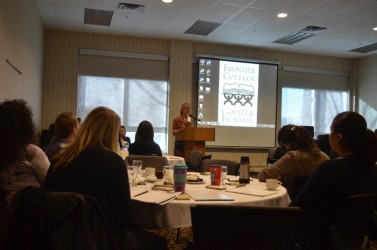Article Origin
Volume
Issue
Year
Literacy is central to keeping youth out of the criminal justice system.
“A lack of literacy means a lack of employment. It is very difficult to get a job if you can’t read or write,” said Kyle Dube, executive director of YOUCAN Youth Services and vice chair of REACH Edmonton board. “These young people need to see the importance of employment, which only comes from being literate.”
Dube was the keynote speaker on Feb. 20 at Frontier College’s forum on Literacy’s Impact on Criminal Justice and Youth, in Edmonton.
“Many of these young people have not been successful at school – either from poor attendance or being kicked out due to behavioural issues – and unfortunately a lot of them fall between the cracks and they don’t get the education they need which means their literacy is not what it should be,” he said. “If these kids are not educated, if they don’t see the potential for education and being literate, then crime is an easy out for them.”
Karen Erickson, formerly of Native Counselling Services of Alberta, said Aboriginal youth are particularly vulnerable because of “intergenerational issues caused by residential school experiences which have disrupted the fundamental relationship between parents and children, and led to a disconnectedness from ceremonies like sweats.” She also listed racism and the effects of colonization as factors, and stressed the need for self-determination.
“An effect of residential schools is parents not knowing how to nurture their children.This starts the path to poverty through not attending school and self-medication from not being connected to a support network,” added David Berger, deputy executive director with Boyle Street Community Services.
Many local agencies offer programs that encourage literacy amongst youth. Erickson talked about Pohna: Keepers of the Fire, a gang intervention program, while Berger touched on Boyle Street’s Water Wings program, which largely serves an Aboriginal and immigrant population by helping break through barriers to employment. The program offers resume building, careers searches, the acquisition of safety tickets, and other job-related assistance
Dube said the government has a role to play in the quest towards youth literacy.
“I think what they can continue doing is finding different ways of engaging non-traditional education, to teach the same things but in different ways. They need to continue supporting organizations in working with some of the barriers to success that these young people have in education in order for us to get them back in school,” he said.
Forums like this are part of Frontier College’s legacy which was founded in 1899 to take literacy to the frontiers, said Abby Robins, director of communications for Frontier College.
“We still work on the frontiers, but now, those frontiers are places like inner-city schools, prisons, Aboriginal communities, and shelters. We work with children, youth, and adults, helping them improve their literacy and increase their opportunities,” she said.
The forum was a national event, taking place in Vancouver, Winnipeg, Toronto, and Halifax as well. A panel discussion in Winnipeg live streamed to all locations.
- 1688 views

